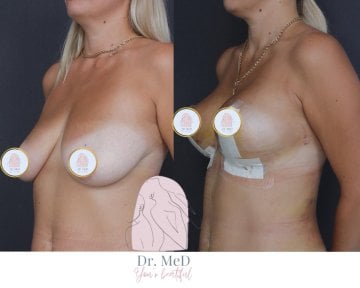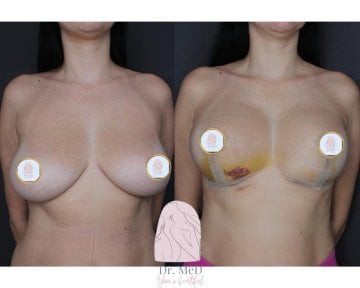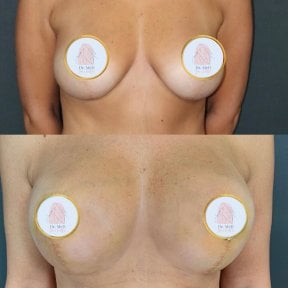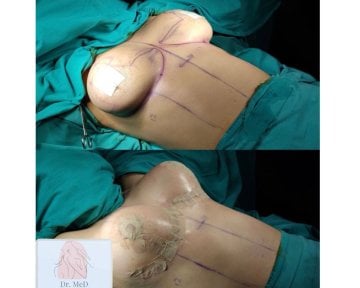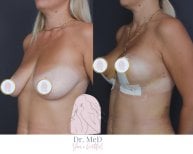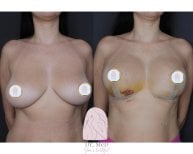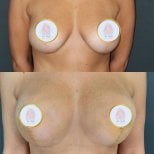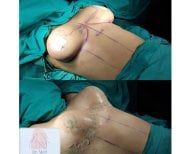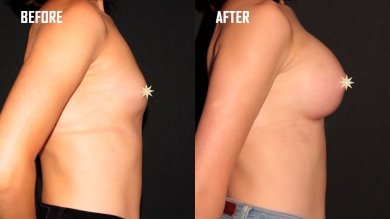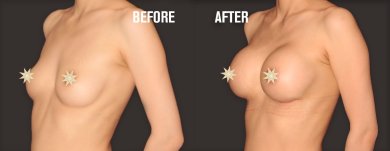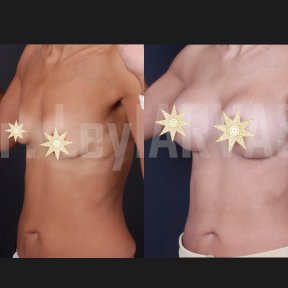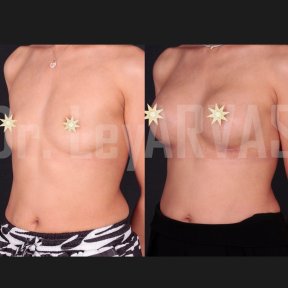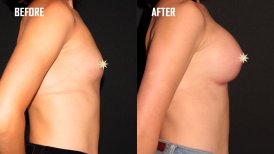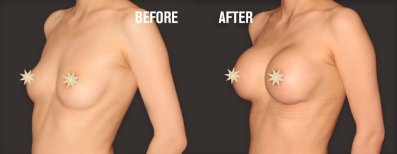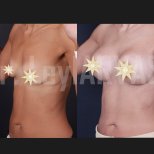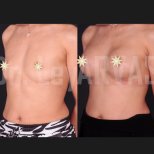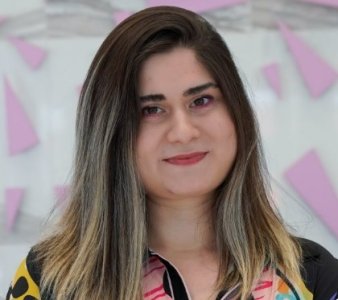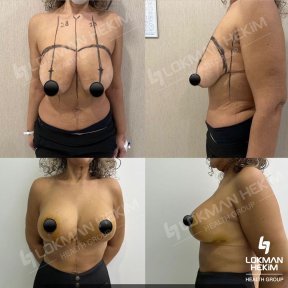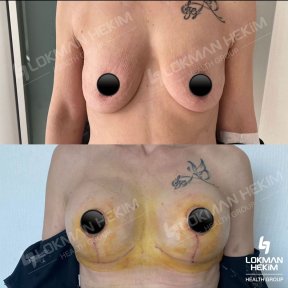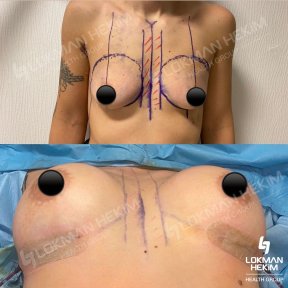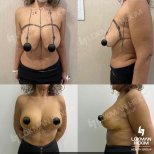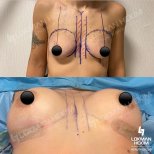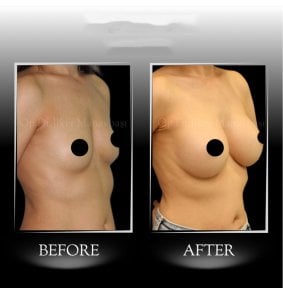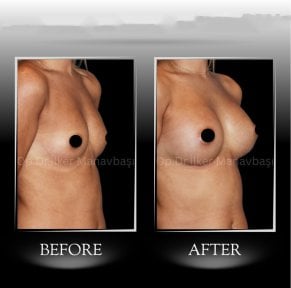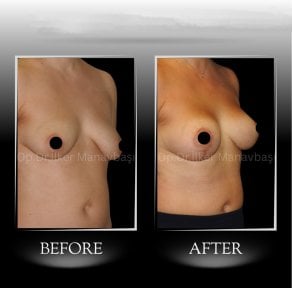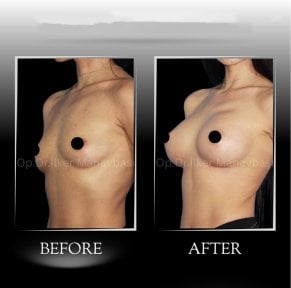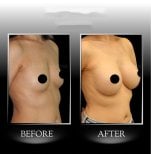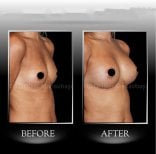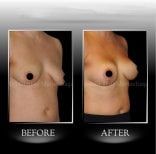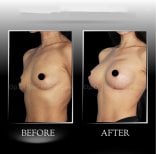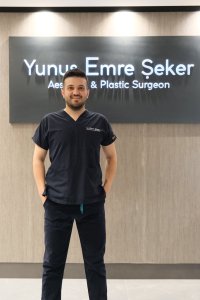Dr. Muhammet Mustafa Aydinol specializes in scarless breast lift techniques with 15+ years experience performing 900+ procedures. Surgery may cost around 4,990 EUR in the current campaign – typically covering the procedure, 1-2 nights hospitalization, 5 nights hotel stay, transfers, and post-op care. A member of ISAPS, Dr. Aydinol achieves a 98.5% success rate for combined mommy makeovers. The clinic maintains a 4.9/5 rating from 190+ patient reviews.
What is breast augmentation?
Breast augmentation is a surgical procedure that enhances the size and shape of a woman's breasts. The surgery involves placing implants – either silicone gel or saline-filled – underneath the breast tissue or chest muscles. Modern techniques allow surgeons to customize the procedure based on individual anatomy and desired outcomes.
The procedure can also involve fat grafting, where fat is carefully removed from one part of the body using gentle suction, processed to separate healthy fat cells, and then injected into the breasts to create natural-looking enhancement.
What are breast augmentation surgery types?
|
Technique |
Pros |
Cons |
|---|---|---|
|
|
|
|
|
What is the cost of breast enhancement in Turkey?
The cost of breast augmentation in Turkey ranges from $3,900 to $5,500 according to current Bookimed data, making it significantly more affordable than similar procedures in the US or UK. This represents potential savings of 60–70% compared to Western countries, where procedures typically cost $6,000–$12,000.
What is included in the cost?
The comprehensive package includes:
- Full treatment plan and surgical procedure
- Nursing service and medical team fees
- Doctor and operating room fees
- Hotel accommodation during recovery
- Airport pickup and drop-off transfers
- Preoperative tests and medical equipment
- Post-operative medications and compression garments
- Stay accommodation for 1 accompanying person
How long would I need to stay for the procedure?
You would need to stay for around 8–10 days for the complete treatment plan, including pre-operative consultation, surgery, initial recovery, and follow-up appointments to ensure proper healing.
What types of breast implants are used for the procedure?
After comprehensive consultation, surgeons typically use teardrop-shaped implants for the most natural appearance. The size and type of implant are determined using specialized measuring devices and fitting bras during your pre-operative consultation. Modern implants include silicone gel, saline, and cohesive gel options, each designed for specific patient needs and preferences.
What precautions should I take before surgery?
Pre-operative preparation includes:
- Stop smoking at least two weeks before the operation
- Refrain from eating or drinking for 8 hours before surgery
- Avoid blood-thinning medications like aspirin
- Complete all required medical tests and evaluations
- Inform your surgeon of any medical conditions, including Hepatitis B or C
What kind of support is provided after the operation?
Post-operative care includes comprehensive support:
- Implant passport and warranty certificate
- 24/7 post-operative care in the clinic
- Regular follow-up examinations
- All necessary medications
- Specialized compression garments
- Direct access to your surgical team for questions
How many nights would I need to stay in the hospital after the operation?
One night of hospitalization is required after the operation, with three meals provided and nursing care available around the clock to monitor your initial recovery.
Are there any other procedures included in the cost?
The quoted cost covers breast augmentation specifically. Additional treatments would involve separate pricing. Some patients choose to combine procedures for comprehensive aesthetic enhancement.
Is there a consultation with the doctor before the breast enlargement?
Yes, a detailed consultation with your surgeon occurs the day before the operation. This includes thorough examination, implant fitting and sizing, discussion of expectations, and final procedure planning to ensure optimal results.
Are anesthesia costs included in the total cost?
Yes, all anesthesia costs are included in the total package price, including general anesthesia administration and consultation with a board-certified anesthesiologist for your safety and comfort.
Why do people go to Turkey/Istanbul for breast surgery procedures?
Turkey, particularly Istanbul, has become a leading destination for breast augmentation due to several compelling factors:
- Affordable costs: Procedures cost 60–70% less than US/UK equivalents while maintaining international quality standards.
- Experienced surgeons: Leading facilities such as Dr. MED (4.9/5, Istanbul), Soraca Med (4.9/5, Antalya), and Istanbul Aesthetic Plastic Surgery Center (4.7/5, Istanbul) house specialists with extensive breast augmentation experience.
- High standard of care: Top-rated facilities like Lokman Hekim Istanbul Hospital (4.8/5) and Quartz Hospital (4.7/5) maintain internationally recognized accreditation standards like JCI, ISO, and ISAPS.
- Comprehensive packages: Turkish clinics offer all-inclusive packages covering surgery, accommodation, transfers, and post-operative care.
A patient from Germany who received treatment at Lokman Hekim Istanbul Hospital shared: "The doctor was very attentive, both before the operation, during the examination, and after. Service staff, very nice nurses... the room was large, clean with breakfast included! There was always a transfer!"
How do you get ready for mammoplasty?
Preparation for breast augmentation involves several important steps:
- Comprehensive physical examination and medical history review
- Laboratory tests including blood work and cardiac evaluation
- Mammogram or breast ultrasound for baseline imaging
- Avoiding certain medications like aspirin and anti-inflammatory drugs that can increase bleeding
- Quitting smoking at least 2 weeks before surgery to promote proper healing
- Arranging post-operative support and recovery assistance
What care is needed after breast enlargement?
Post-operative recovery follows a structured timeline for optimal healing:
Week 1: Most discomfort occurs during the first 3–5 days. Patients can typically return to desk work within 1–2 weeks while taking prescribed pain medications and wearing supportive garments.
Weeks 2–4: Gradual return to light activities with continued use of supportive bras. Studies show patients with placement above the muscle have shorter recovery periods than those with placement under the chest muscle.
Week 6: Full recovery typically achieved with clearance for heavy lifting and strenuous exercise. Clinical studies show most patients rate their recovery as meeting expectations at this point.
Long-term: Final results become visible after 3–6 months as implants settle into their natural position. Regular follow-up appointments ensure proper healing and long-term satisfaction.
What are the possible risks with breast implants?
While breast augmentation is generally safe when performed by qualified surgeons, patients should understand potential complications:
- Capsular contracture. This occurs when scar tissue around the implant tightens, affecting 7.2% of primary augmentations according to FDA studies of nearly 100,000 patients.
- Reoperation needs. Medical research shows 11.7% of patients require additional surgery within 7 years, though this includes both minor adjustments and major revisions.
- Infection. Occurs in less than 1% of cases when proper surgical protocols are followed.
- Changes in sensation. Temporary changes in nipple or breast sensation may occur but typically resolve within months.
- Implant issues. Modern implants are highly durable, but rupture or leakage can occur over time, particularly with older implant types.
Who should consider breast enhancement?
Ideal candidates for breast augmentation include women who:
- Are unhappy with the size, shape, or symmetry of their breasts
- Have lost breast volume due to aging, weight loss, or pregnancy
- Experience sagging breasts that affect their confidence
- Are in good overall health with realistic expectations
- Have completed breast development (typically over 18 years old)
- Are not currently pregnant or breastfeeding
When is a good time to get breast enlargement surgery?
The optimal timing for breast augmentation is when a woman is in good health, has realistic expectations about outcomes, and is emotionally prepared for the changes. It's advisable to schedule surgery when you can take adequate time off for the 4–6 week healing process and have support during recovery.
Many patients choose to have the procedure during cooler months when wearing supportive garments is more comfortable, or when they can take extended time away from work or social commitments.
Do clinics offer a check-up before the procedure?
Yes, reputable clinics conduct comprehensive pre-operative evaluations including:
- Detailed physical examination and medical history review
- Laboratory tests to assess overall health
- Breast imaging studies when appropriate
- Consultation with the anesthesiologist
- Discussion of expectations and surgical planning
- Implant sizing and selection process
What are the long-term results and patient satisfaction?
Breast augmentation demonstrates excellent patient satisfaction rates based on extensive clinical research. American Society of Plastic Surgeons research shows 98% of women report results meeting or exceeding expectations, with 92% experiencing improved self-esteem and 64% reporting improved quality of life.
A clinical study of 494 consecutive patients demonstrated median satisfaction scores of 86% for overall outcomes and 100% satisfaction with surgeons and medical teams. The study also showed very low complication rateswhen following optimized surgical protocols:
- 1.3% capsular contracture;
- 0.6% asymmetry;
- 0.4% malposition.
What other treatments do clinics in Turkey offer besides breast augmentation?
Leading Turkish medical centers provide comprehensive aesthetic and medical services:
- Cosmetic surgeries: Liposuction, rhinoplasty, tummy tuck, and facial procedures.
- Dental procedures: Crown fitting, veneers, implants, and smile makeovers.
- Eye surgeries: Upper eyelid surgery, blepharoplasty, and vision correction.
- Non-surgical treatments: Botox, dermal fillers, laser treatments, and skin rejuvenation.
- Hair restoration: Hair transplant procedures and scalp treatments.
- Body contouring: Brazilian butt lift, body lift, and skin tightening procedures.
What qualifications should the surgeon have?
An ideal breast augmentation surgeon should possess:
- Medical degree from a recognized institution
- Specialized training in plastic and reconstructive surgery
- Board certification from reputable medical organizations
- Extensive experience performing breast augmentation procedures
- Hospital privileges at accredited medical facilities
- Ongoing education in latest surgical techniques
- Strong patient safety record and positive reviews
Leading specialists such as Dr. Ergin Er at Istanbul Aesthetic Plastic Surgery Center and Dr. Murat Yaman at Lokman Hekim Istanbul Hospital exemplify these qualifications with extensive experience in breast enhancement procedures.
What awards should a good clinic have?
Reputable clinics should ideally hold accreditations and awards from recognized international bodies:
- International accreditations: Joint Commission International (JCI), International Organization for Standardization (ISO).
- Quality certifications: European Foundation for Quality Management (EFQM).
- Industry recognition: IMTJ Medical Travel Awards, Global Healthcare Accreditation Program.
- Hospital rankings: World's Best Hospitals recognition by Newsweek.
- Specialty awards: Excellence in Plastic Surgery, Patient Choice Awards.
- Safety certifications: Patient safety and infection control accreditations.
These certifications ensure that clinics maintain international standards for patient safety, surgical outcomes, and overall care quality.
